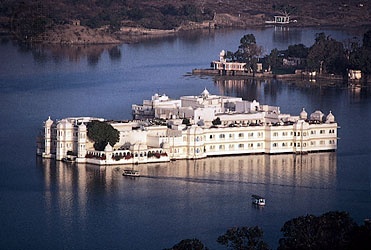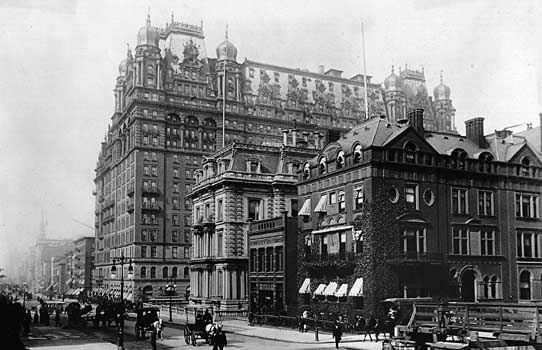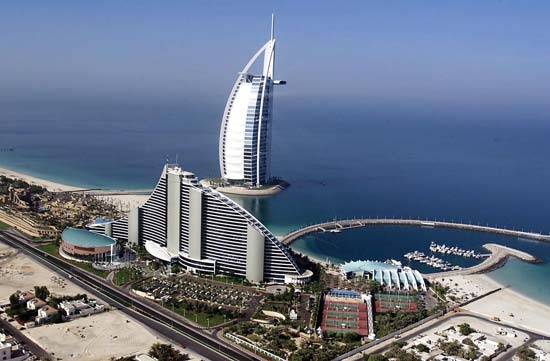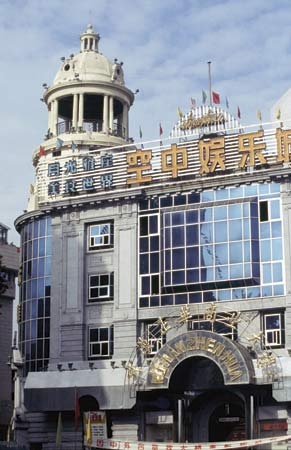hotel
 building that provides lodging, meals, and other services to the traveling public on a commercial basis. A motel performs the same functions as a hotel but in a format designed for travelers using automobiles.
building that provides lodging, meals, and other services to the traveling public on a commercial basis. A motel performs the same functions as a hotel but in a format designed for travelers using automobiles.Inns (inn) have existed since very ancient times to serve merchants and other travelers. In the Roman Empire hostelries called mansionis were situated along the Roman road system to accommodate travelers on government or commercial business. The commercial revival of the European Middle Ages stimulated a widespread growth of inns and hostels. Many of these were operated by monastic brotherhoods in order to guarantee haven for travelers in dangerous regions; a famous example is the hostel in the Great St. Bernard Pass (Great Saint Bernard Pass) in the Swiss Alps, which was founded in the 10th century by St. Bernard of Montjoux and is still operated by the community of Augustinian monks. In 13th-century China Marco Polo (Polo, Marco) found an extensive system of relay houses in existence to provide lodgings for travelers and way stations for the Mongol postal service.
Privately operated inns intended primarily for use by merchants were widespread in both Islāmic and western European countries during the later Middle Ages. The rapid proliferation of stagecoach travel during the 18th century further stimulated the development of inns. But it was the Industrial Revolution of the 19th century that stimulated the most progress in innkeeping, especially in England, whose inns became a standard for the world on account of their cleanliness and comfort. Meanwhile, American innkeepers were setting a standard for size; by 1800 the inns of the United States were the largest in the world. The American trend toward large size continued into the 20th century and eventually was adopted by other countries.

 The modern hotel was to a large extent the result of the railroad age; faster travel eliminated the need for the inns serving the old coach routes, and many of these were forced out of business as a result. On the other hand, many new and larger hotels were profitably built close to railroad stations. As travel for pleasure became increasingly popular during the 19th century, a new class of resort hotels was built in many countries. Along the French and Italian Riviera resort hotels were constructed to serve wealthy vacationers, who frequently came for the entire summer or winter season. Luxury hotels soon made their appearance in the cities; in 1889 the Savoy Hotel in London set a new standard with its own electricity and its host of special services for guests.
The modern hotel was to a large extent the result of the railroad age; faster travel eliminated the need for the inns serving the old coach routes, and many of these were forced out of business as a result. On the other hand, many new and larger hotels were profitably built close to railroad stations. As travel for pleasure became increasingly popular during the 19th century, a new class of resort hotels was built in many countries. Along the French and Italian Riviera resort hotels were constructed to serve wealthy vacationers, who frequently came for the entire summer or winter season. Luxury hotels soon made their appearance in the cities; in 1889 the Savoy Hotel in London set a new standard with its own electricity and its host of special services for guests.Another landmark was the opening in Buffalo, N.Y., in 1908 of the Statler Hotel, whose owner, Ellsworth Milton Statler (Statler, Ellsworth Milton), introduced many innovations in service and conveniences for the benefit of the large and growing class of business travelers. From the Buffalo Statler grew the Statler Company, the first great chain operation in hotelkeeping.
World War I was followed by a period of tremendous hotel construction, and hotels also increased in size; the Stevens Hotel (later the Conrad Hilton) in Chicago opened with 3,000 rooms and retained the title of the world's largest until the late 1960s, when the Hotel Rossiya opened in Moscow. After World War II many hotels were built at or near major airports.
The operation of hotel chains became a characteristic of modern hotelkeeping, particularly in the decades after World War II. A chain operation, in which one company operates two or more hotels, permits increased efficiency in such areas as purchasing, sales, and reservations.
 The main categories of hotels are transient, resort, and residential. Hotels are classed as “mainly transient” when at least 75 percent of their guests are not permanent residents. The guest in a typical transient hotel can expect a room with private bath, telephone, radio, and television, in addition to such customer services as laundry, valet, and cleaning and pressing. A larger establishment usually has a coffee shop, dining room, cocktail lounge or nightclub, and a gift shop or newsstand-tobacco counter.
The main categories of hotels are transient, resort, and residential. Hotels are classed as “mainly transient” when at least 75 percent of their guests are not permanent residents. The guest in a typical transient hotel can expect a room with private bath, telephone, radio, and television, in addition to such customer services as laundry, valet, and cleaning and pressing. A larger establishment usually has a coffee shop, dining room, cocktail lounge or nightclub, and a gift shop or newsstand-tobacco counter. The resort hotel is a luxury facility that is intended primarily for vacationers and is usually located near special attractions, such as beaches and seashores, scenic or historic areas, ski parks, or spas. Though some resorts operate on a seasonal basis, the majority now try to operate all year-round. The residential hotel is basically an apartment building offering maid service, a dining room, and room meal service. Residential hotels range from the luxurious to the moderately priced. Some resort hotels operate on the so-called American plan, in which the cost of meals is included in the charge for the room. Others operate on the European plan, in which the rate covers only the room and guests make their own arrangements for meals. Transient hotels generally operate on the European plan.
The resort hotel is a luxury facility that is intended primarily for vacationers and is usually located near special attractions, such as beaches and seashores, scenic or historic areas, ski parks, or spas. Though some resorts operate on a seasonal basis, the majority now try to operate all year-round. The residential hotel is basically an apartment building offering maid service, a dining room, and room meal service. Residential hotels range from the luxurious to the moderately priced. Some resort hotels operate on the so-called American plan, in which the cost of meals is included in the charge for the room. Others operate on the European plan, in which the rate covers only the room and guests make their own arrangements for meals. Transient hotels generally operate on the European plan.- Archaic culture
- Archaic period
- Archaic smile
- archangel
- archbishop
- archbishop of Canterbury
- Archbishop of Reims Fulk
- Archbishops of Canterbury
- archdeacon
- archduchess of Austria Isabella Clara Eugenia
- archduke
- Archduke Albert
- Archduke and Crown Prince of Austria Rudolf
- Archduke Charles
- archduke of Austria-Este Francis Ferdinand
- Archean Eon
- arched harp
- archegonium
- Archelaus
- Archelon
- archer fish
- Archer, Frederick
- Archer, Frederick Scott
- Archermus
- Archer, Thomas